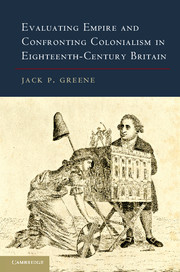Book contents
- Frontmatter
- Contents
- Preface Confronting Empire
- Prologue “Scene of a Foul Transaction”
- 1 “The Principal Cornucopia of Great-Britain's Wealth”
- 2 Outposts of “Loose Vagrant People”
- 3 “A Fabric at Once the Dread and Wonder of the World”
- 4 Arenas of “Asiatic Plunder”
- 5 Sites of Creolean Despotism
- 6 “A Fruitless, Bloody, Wasting War”
- 7 “This Voraginous Gulph of Hibernian Dependence”
- 8 A “Shadow of Our Former Glory”?
- Epilogue “Against Every Principle of Justice, Humanity, and Whatever is Allowed to be Right Among Mankind”
- Index
- References
5 - Sites of Creolean Despotism
The Languages of Humanity and Justice and the Critique of Colonial Slavery and the African Slave Trade
Published online by Cambridge University Press: 05 June 2013
- Frontmatter
- Contents
- Preface Confronting Empire
- Prologue “Scene of a Foul Transaction”
- 1 “The Principal Cornucopia of Great-Britain's Wealth”
- 2 Outposts of “Loose Vagrant People”
- 3 “A Fabric at Once the Dread and Wonder of the World”
- 4 Arenas of “Asiatic Plunder”
- 5 Sites of Creolean Despotism
- 6 “A Fruitless, Bloody, Wasting War”
- 7 “This Voraginous Gulph of Hibernian Dependence”
- 8 A “Shadow of Our Former Glory”?
- Epilogue “Against Every Principle of Justice, Humanity, and Whatever is Allowed to be Right Among Mankind”
- Index
- References
Summary
Contemporaneous with the emergence of metropolitan concern with the plunder of India, analysts of overseas empire also produced a compelling critique of the systems of enslavement that had long powered the economic development of so many of Britain's American colonies. Quickly broadening to include the entire transatlantic commercial complex involved in the African trade that supplied the colonies with slaves, this critique focused on yet another area to which the languages of humanity and justice could be appropriately applied to assess the social and human costs of British overseas empire and the misbehavior of those Britons who participated in it. Condemning as barbarous and inhuman the planters and traders who, in quest of their own economic betterment, were the primary agents in and benefactors from the enslavement and destruction of so many thousands of people, these analysts focused on the Creole slave owner as a villainous social type every bit as antithetical to metropolitan British social and moral standards as the Indian nabob. In contrast to the situation with the Indian problem, however, this critique did not arise out of an entirely new development within the empire. English participation in the slave trade dated to the sixteenth century, while colonial use of enslaved Africans was already widespread in Barbados by the 1650s. Rather, the building condemnation of the British overseas slave system had its basis in an ancient English disquiet, manifest in the strictures of Morgan Godwyn, Thomas Tryon, and others around the turn of the seventeenth century, that had resurfaced briefly in the 1730s and, as argued in Chapter 2, still functioned to sustain the metropolitan impulse to apply a language of alterity to American colonists.
Indeed, the conception of the Creole as a deviant and distinctive social type within the English-speaking world was already relatively pervasive by the time East Indian problems came to the attention of the British public in the mid-1760s. As early as the late 1740s, the anonymous author of The Fortunate Transport had endeavored to lend authenticity to his unflattering portrait of the colonial societies of Virginia and Jamaica and the morally deficient and cruel populations who dominated them by signing his production with the name “A Creole.”
- Type
- Chapter
- Information
- Publisher: Cambridge University PressPrint publication year: 2013



